Of Maus & Morality
A Defense of Art Spiegelman‘s "Maus" & An Exposure of How the Censorship of what's Uncomfortable, Sows the seeds of Ignorance, Fanaticism, & Bigotry.
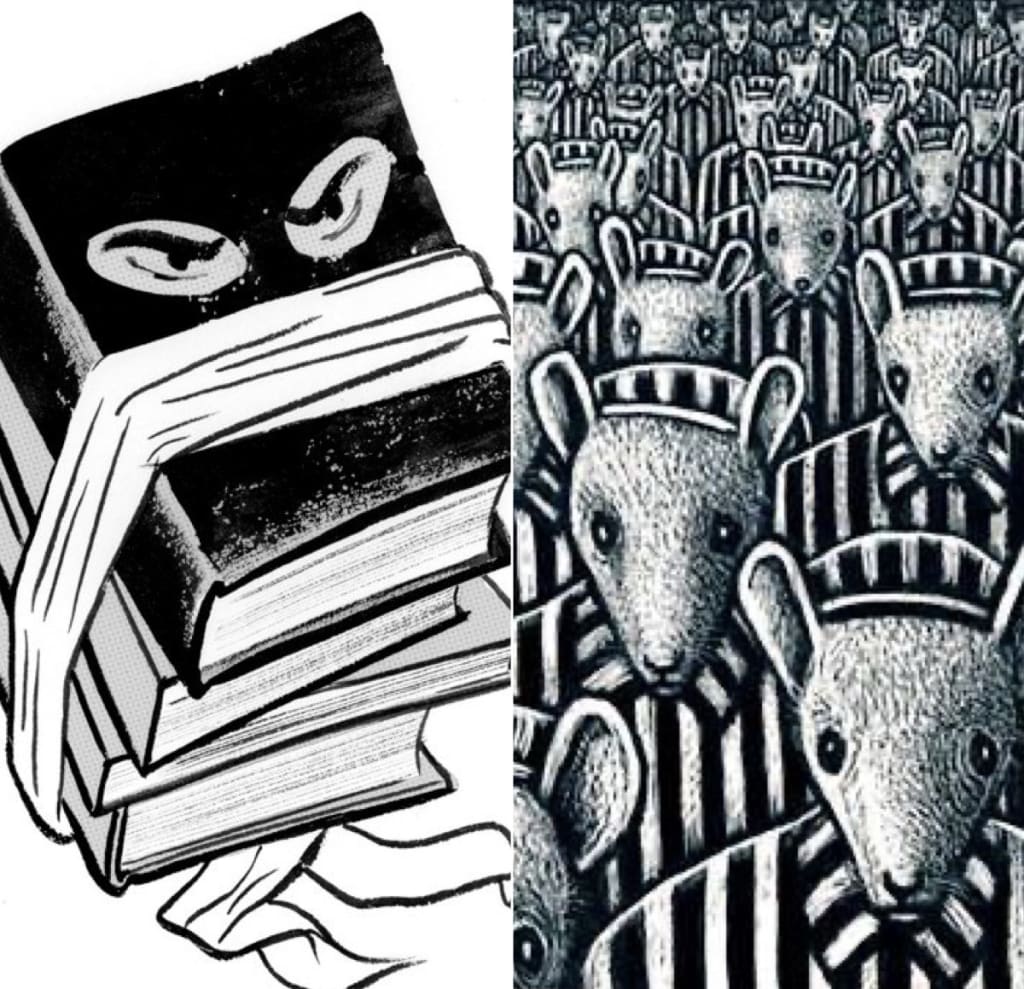
On January 27, 2022, (International Holocaust Rememberance Day) the news broke of a unanimous 10-0 vote by Tennesee's McGinn County School Board to remove Art Spiegelman‘s graphic novel, Maus, from the shelves of their school libraries & the curriculum of their English/Litrarature classes; due to concerns pertaining to the use of oscene language and depictions of nudity. As someone of German heritage, who was also lucky enough to be exposed to the history of the Holocaust & Holocaust literature throughout my school years & well into college (including Anne Frank's The Diary of A Young Girl, John Boyne's The Boy in the Striped Pyjamas, Elie Wiesel's Night, & Abbey Mann's Judgement at Nuremberg) I find myself in a state between perplexed, appalled, and offended to learn of this decision. To have a work like this be banned by a school board is the same sort of ignorance that the Nazis themselves are guilty of when they censored and set giant piles of books aflame for the sake of their own political gains; to control the mindset of the general population & regulate what materials and topics were taught to the nation's youth as they develop into adulthood. The same scenario applied to the fields of history & archeology (as discussed in another Vocal piece I wrote, entitled Discomfort & Intolerance). Even today, the fields of history & literature come under scrutiny by political entities, with the controversial teachings of Critical Race Theory. Though, to combat these issues through censorship & legal action, is only the continual cycle of sowing the seeds of ignorance that will only grow into the future harbingers of destruction, and leave us all horribly perplexed; wondering "How could this happen?", "Where did we go wrong?", and "What could we have done to stop it before it came to this?".

When I first discovered Maus, I was 21 years old & a junior in college. It was never part of any class curriculum I attended. I was participating in a summer study abroad program in Amsterdam, when after touring the Anne Frank House, I purchased a copy of the graphic novel at the gift shop. Since it was a graphic novel, that's what stood out to me, in the heat of the moment. I was only beggining to delve into how the style of art associated with comic books, as well as animated media, could be more than just entertainment for younger audiences; but a tool of social and political commentary (sometimes aimed explicitly for adults, in the case of the films of Ralph Bakshi). From the time I bought the novel to the time I got back to Indiana from the college program, I refused to put it down. Rarely has a piece of literature ever compelled me to keep reading it and having to actually close the book and set it aside for later, left me feeling in a state of astonishment and addiction (telling myself, over and over, "I need to keep reading it. I need to find out what happens next!"), page by page & chapter by chapter. Even now, three years after that purchase, I can say that the experience of reading Maus marked a solid before & after in my mind, in terms of the visual use of so-called "low art" as a means of expressing the messages and narratives associated in the more respected works of "high art". Yet, it also dissapoints me to think that American students will now be deprived of that experience, with another addition to the infamous "Banned Books List". Maus did far more than teach me about the Holocaust in the ways I absorbed it from my days cooped up in classrooms. It taught me about the mundane horror of these atrocities committed, the lasting trauma that survivors must battle internally, years and decades after the physical struggle is over, as well as the inherited misery which is handed down to their children, & how they can either use it as an excuse to play the victim or as a tool to make real change for a better future.

I am, by no means, at all, an expert in the field of education in America. Despite double majoring in both theatre & history in college, I have no intent to persue the career of being a teacher. However, I believe that I can safely say that students in the late elementary & middle school bracket (Fourth Grade to Eighth Grade) have learned a good deal about the Holocaust. By the time I was that age (around 11 to 14 years old), I had known about Adolf Hitler, the concentration camps, and the Nazi Party's political regime which took the lives of over 17,000,000 people between 1933 & 1945. I knew what antisemitism was. I know it's been one of the most infamous ills throughout the history of humankind (and I know it's still out there). I’m not just talking about the Aryan Brotherhood, Stormfront, or other hate groups that are easy for some to brush off as irrelevant, fringe radicals. Most of all, I have witnessed acts of antisemitism first-hand. Including a time when street preachers made a spontaneous and undesired appearance on campus, & shouted in the face of my roommate, walking past them & minding his own business, that he & "his kind" were bound to the fires of Hell, for murdering a certain somebody, 2,000 years ago.
For the Jewish community and for politically conscious history buffs like myself, the Holocaust is not some distant event found only in textbooks and museums. I've had the opprotunity to meet, face to face, survivors. People with numbers tatooed onto their arms as a reminder of their once "non-human" status. Furthermore, I cannot say enough about how burdensome it is; coming to grips with the fact that some of the same people who starved for days on end, beaten relentlessly, and forced to watch their loved ones die in ways that most of us (in today's comfortably pampered society) can hardly imagine are still alive & willing to tell their stories. However, it’s anything but ancient history. Most living Holocaust survivors would have been no older than the average middle school student (11 to 14 years old) when they experienced such outrageous cruelty.
One of the many things that made Maus such an impactful work when I first read it, was its raw and conflicted sense of humanity. The protagonist of the graphic novel, Vladek Spiegelman (the author’s father) is depicted as neither a hero, nor a villain. Along with the other victims of Nazi oppression throughout the book, they are not shown as defiant martyrs, commiting a faithful last act of defiance before being killed off. Despite their artisitic renderings as personfied mice, cats, dogs, fish, deer, and pigs, they're still human in nature; living day by day with the same moral conundrums like everybody else, and forced to confront a political entity that sought to strip them of their liberty, their humaity, and their lives. We remember Vladek’s story because his son chose to showcase him as the man who raised him & lived under the same roof with him. Deciding to neither praise nor condemn him for his actions made while living in a homemade bunker in a Polish ghetto & later on in the Auschwitz concentration camp. Vladek could very well have been one of our friends, neighbors, or relatives.


As I continuted to read, I also found myself surprised by its brutally honest realism, beyond the comic book illustrations, or violence and profanity depictied on the drawn out pages. Vladek’s story is never embellished or romanticized as something that it wasn't. It wasn't a Joseph Campbell monomyth (better known as the "hero's journey") that audiences have seen thousands of times over. Approximately half of the book takes place during the Second World War; meanwhile, the other half takes place in the early 1980's in Rego Park, New York; where Spiegelman interviews his father about his past. A past that over the course of time causes many fluctuations in their relationship as father & son. The use of a more contempoary setting and era to tell the story, serves as a subtle aid to help the reader realize that despite an almost nine decade gap netween the outbreak of war in 1939, and the modern day in 2022, the aftermath of the Holocaust is far from over. Like a lingering fallout from the tremendous power of a hurricane or tornado. The trauma brought on from those days of suffering drove Art’s mother to commit suicide. Even his father, Vladek, for all the endeavors he partook as a Polish soldier & P.O.W., to a ghettoized civilian & Auschwitz inmate, to become a bitter and hot-tempered old man in America. Seeing it through the eyes of the son is just another way to build a rapport with these characters and build paralells between them and people we know in real life (even our own selves). For as easy as it is to say that if we were alive in that place & time, we'd be one of "the good ones" who realized when things had gone too far, and helped hide people in our basements, and served as spies for the resistance groups towards defeating the Reich, most people would be horrifyingly surprised at how easy they would've been duped into a fascist way of thinking and actually contributing to the Nazi agenda; out of a sense of national pride or simply not wanting to get into trouble.
As a reader, and someone who grew up with a stigma towards my German name & ancestral roots, (playing World War Two themed dodgeball during recess & always being on the Axis team certainly didn't help), I needed that sense of empathy Spiegelman used as the primary tool in the course of fleshing out his father and the other characters beyond mere token steryotypes in a "good VS evil" narrative. A story like Maus was a necessity for me, because I needed to see those who went through the persecution & the camps not just as innocent victims or a set of numbers listing off how many of this group or that group were killed in gas chambers, but as complicated, vulnerable, and very real people. The students of America need that, as well; and they’re not going to get it if authority figures continue to value a petty notion of safety higher than education that is difficult, controversial, and accurate.
In the case of the McGinn County School Board in Tennessee, I can, perhaps, fairly say that the Jewish community is an extreme minority. Yet, I cannot stress enough about how important learning about the histories of people & cultures are not your own is paramlunt to a well-rounded education; be it the education of a fourth grader or a university sophmore. To do otherwise, breeds the vices of ignorance with narratives of national exceptionalism & bigotry within convient imagrey with backwards messages, that grow into the wicked poison ivy of fanatacism; befowling the social gardens of nations. Such befowling was manifested in (arguably) it's ugliest form on November 8, 1923, as well as January 6, 2021.
Those who publically and vocally support the unanimous vote to ban the graphic novel claim it is due to overtly risquè content like nude imagery and profane language. Even though my days as a schoolchild are long gone, I can virtually guarantee that the majority of schoolchildren have already heard worse words than “damn”, "fuck", and "shit". They have seen worse than cartoon animals with little to no clothes on. This is not because their parents or teachers failed them, and certainly not because they’ve been playing first person shooter video games or Google searching XXX content. Rather, because the real world is anything but normal and fair. It's a hard and mean place, that no amount of shielding and delusional notions of life being something it clearly isn't will prevent the future leaders of America (and the world) from learning that reality. Especially, by the time they’ve reached the age of 18 and beyoond. How long will these concerned parents and excessively impowered school boards continue their carnivale of censorship? Furthermore, I ask the same question to the poltical pinheads who feel it's their civic duty to stick their noses into these issues as well, with legislation set out to ban & restrict the teaching of critical race theory & Darwin's theory of evolution in the classrooms (yeah, and most people thought the evolution isse died off with the Scopes Monkey Trial; if that's what you thought, then I'm sorry to say that you've been sold a false bill of goods).
Which leads us to another point. The school board claims the ban isn’t because Maus is Holocaust literature (although it’s just as much literature pertaining to the relationship dymanics between parents and children), but because these people find the minimal use of profanity and nudity, in a biographical story about the Holocaust, offensive. Here's the thing. The wholesome Holocaust story that's free of violence, obscenities, and scenes of people in their birthday suits, that students ought to read instead of Maus is about as real as the underwater city of Atlantis (in other words, it doesn't exist). Some may think it does, but in real life, you can't authentically teach the horrors of the Holocaust, without drawing attention to it's systemic perversion. That's like teaching geography without highlighting the role of tectonic plates. It's impossible.
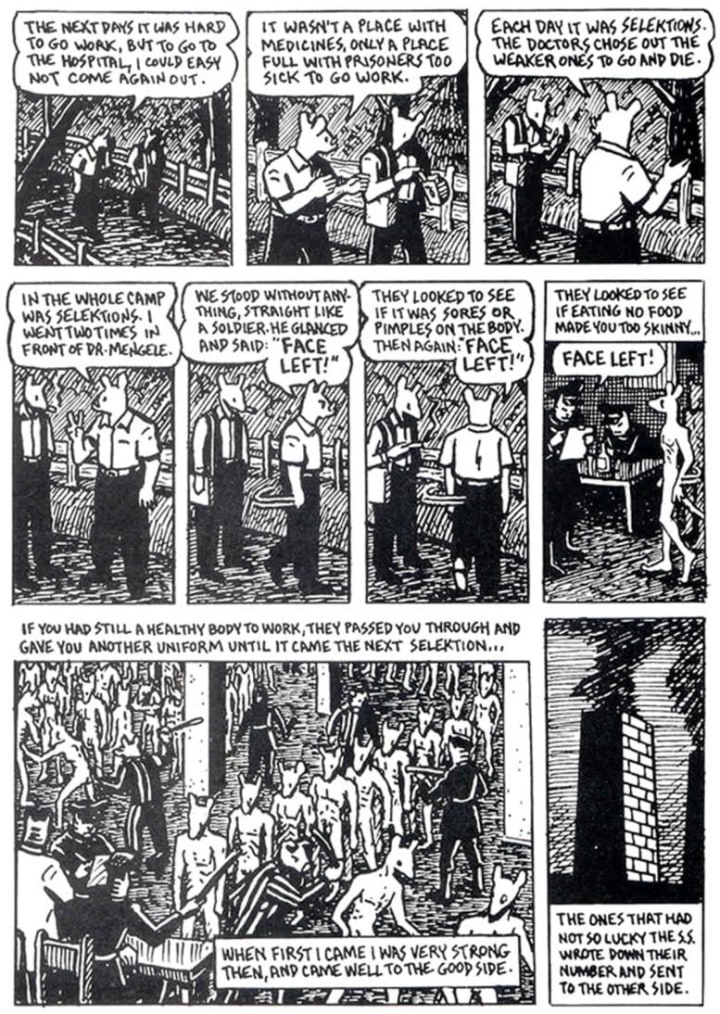
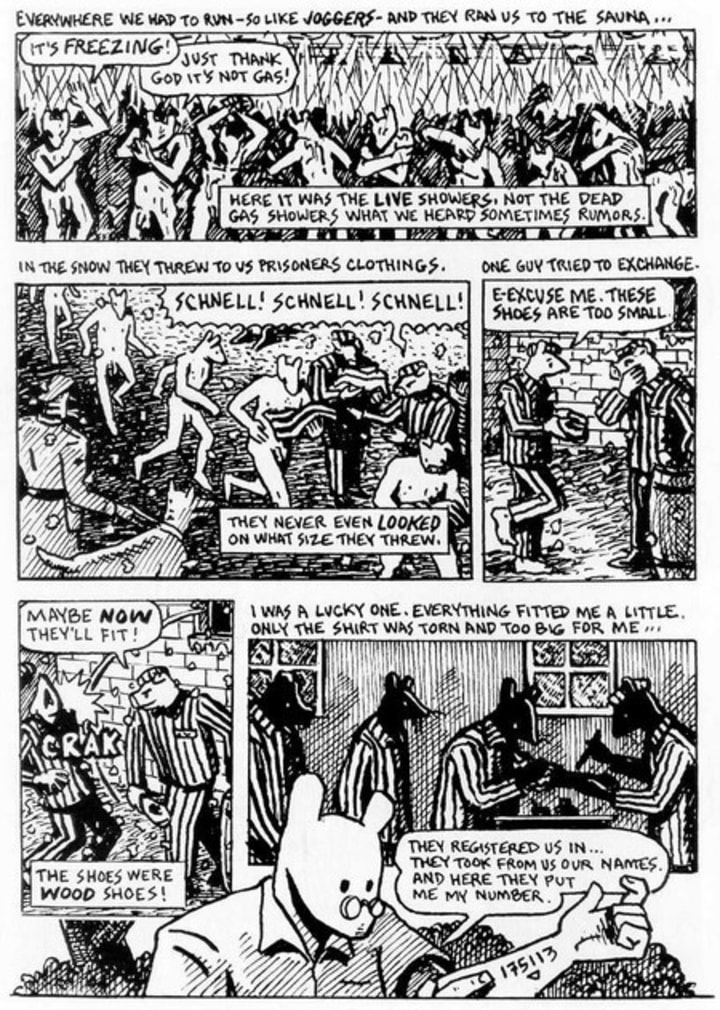
During the course of the meeting in which the vote was held, board member, Tony Allman, claimed that Maus is similar to “when you’re watching TV and a cuss word or nude scene comes on, it would be the same movie without it.”
He later on noted that the author, Art Spiegelman “did graphics for Playboy.”
The absurdity of both remarks is almost beyond belief, for two reasons. One. Maus would not be the same without the language and imagery some may see as shocking or obscene. If a work of art about an era of genocide isn’t being provocative & crossing the line, the people behind the work need to go back to the drawing board. If the audience isn’t upset & grief-stricken while learning about it & aftyerwards, that's a problem. Furthermore, while Art Spiegelman did make occasional freelance contributions to Playboy magazine while also working on Maus (between 1978 & 1982), let me ask a question. Does it suddenly label everything he’s ever put to paper as a vulgar form? Absolutely not. Eventually, somebody is going to have to accept that if someone's job requires giving students a sincere & genuine education, the notions of purifying and cancelling everything that a certain few in power don't like must be discarded. The world doesn't revolve around them (as much as they believe that it does). Yet, I still have some more questions for this school board. Under the circumstances that I had the chance to speak before this board that voted to discard literature due to topical language over deeper and far more profound political subtext. Here's what I would ask them.
- Did it ever come to any of your minds that this unanimous vote was (intentionally or otherwise) a collective act made in support of facism & antisemitism (so much for your "patriotic spirit" that takes center stage with the exhorberent red white and blue decor every Fourth of July)?
- How are you going to explain this decision to your students, while also trying to teach them about the lasting value of the First Amendment?
- Is book banning really something a free society, like that of the United States, should engage in, even if the Nazi's themselves resorted to book banning (& book burning) to achieve similar ends by similar means?
- Does anyone, ideally, have any business in teaching children about civil liberties, if they’re completley gung-ho about stamping out free expression?

In the end, I can only hope this decision is reversed and sets an example for all the other plethora of books out there, that bear their names on the Banned Books List. Though, in my mind, I know that'll never happen. The sad and all too maddening fact is that what happened with this one county school board is no isolated incident. Censorship has always lingered throught time and as long as printed works will be written, those who say it shouldn't be read and bought will be there to make their cases. These self-appointed "free expression warriors" will have no qualms against banning books and other media, for suggesting that history is scattered all about with violence and bigotry that we’re still grappling with today. They say it’s because they’re thinking of the children; protecting them from “alarming" material. That's just the sweet and good looking icing atop a stale and rotten dessert. What's really being seen as alarming by those who can still freely and ablely live their lives alongside it, is the existence of LGBTQ+ people and the idea that they should have the same rights and liberties as everyone else (marry who they desire, adopt children as they desire, work at any job they so please without their status as a part of their community being a deterrent). Same thing with America’s history of oppression towards non-white people, who didn't happen to be lucky enough to be naturally born in the U.S. & of European descent; as well as the reality of antisemitic violence, that's still ongoing, across the globe.
To anyone reading this who doesn't agree, please prove me wrong. That's your freedom. Please exercise it. Make your case that proves to me that what's happened here is nothing like the Nazis rise to power. I'll be more than happy to listen to the points you make (and take notes for reference). For recgonizing the value of the opposition's argument is key to healthy civil discourse. However, I shall make the firm stance that Nazism didn’t start with murder or sterilization. It started with obvious bigotry, justified by pathetic scapegoating, and enhanced by the suppression of free speech. The generations now and the generations to come would know that if they read more & were taught more about it.

About the Creator
Jacob Herr
Born & raised in the American heartland, Jacob Herr graduated from Butler University with a dual degree in theatre & history. He is a rough, tumble, and humble artist, known to write about a little bit of everything.


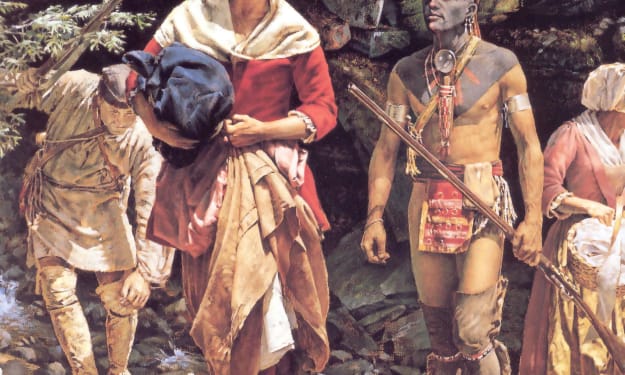
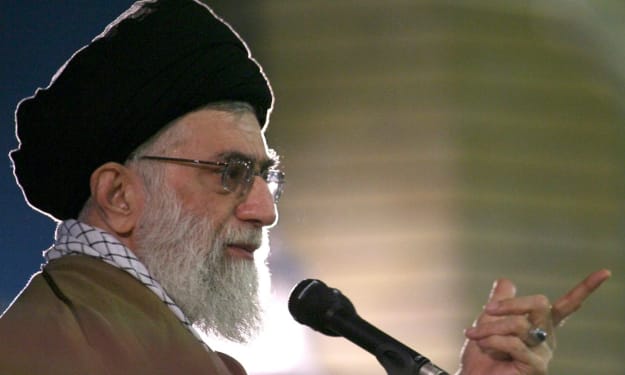
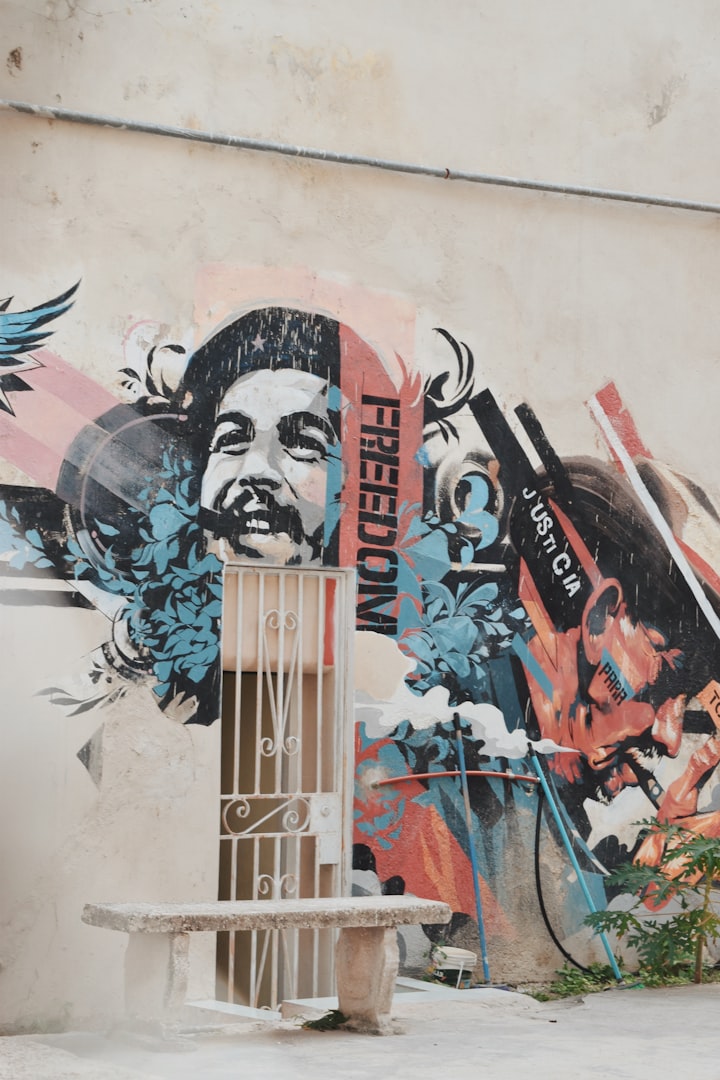

Comments
There are no comments for this story
Be the first to respond and start the conversation.